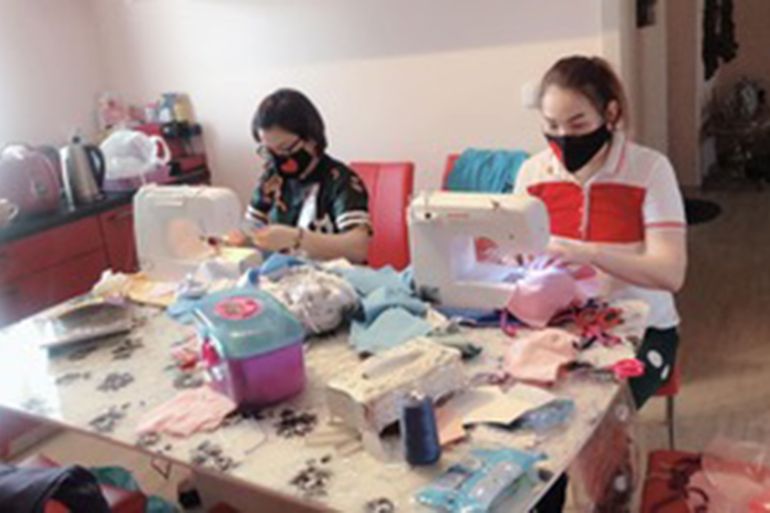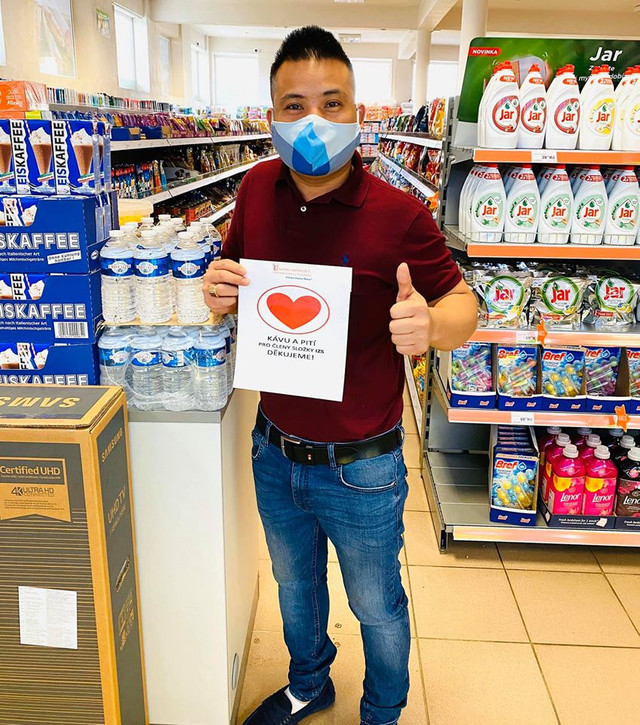Hearts and masks: Czech-Vietnamese solidarity during coronavirus
From sewing masks to providing free refreshments, the Czech Republic’s third-largest minority has played a major role.

In a country as homogeneous as the Czech Republic, the task of social integration can present itself as a nearly unsolvable riddle to many newcomers. Perhaps no one understands this better than the Vietnamese, the country’s third-largest minority.
With the arrival of the COVID-19 pandemic in Europe, the Czech government was quick to implement strict measures to curtail the further spread of the virus. Following Austria and Hungary, it ordered a reinstalment of border checks with neighbouring countries.
Keep reading
list of 4 itemsMexico’s teachers seek relief from pandemic-era spike in school robberies
‘A bad chapter’: Tracing the origins of Ecuador’s rise in gang violence
Why is the US economy so resilient?
Then, in a move that came as a surprise to many other EU capitals, Prague made it mandatory for everyone to wear a face mask in public. Although the usefulness of the measure was not immediately apparent to everyone, the Czechs had no choice but to comply. The problem was how. Although a small country of just over 10 million, the demand for face masks rapidly exceeded the supply by an enormous margin.
While some resorted to the use of home-made alternatives, others decided to put their skills to work to help increase supply. Particularly quick on their feet was a group of young Vietnamese mothers from an NGO called Lam Cha Me CZ (Vietnamese for: being a parent).
“We are in close contact with doctors of Vietnamese origin that work at Czech hospitals. They told us how under-resourced the hospitals are,” Ami Luong, a representative of Lam Cha Me, explained.
The Prague-based NGO was founded about two years ago by a group of young mothers from Vietnam living in the Czech Republic. The initial aim was to provide information to Vietnamese families about legal and administrative hurdles that many immigrants typically face in the Czech Republic.
However, the volunteer group was fast to adjust to the new circumstances. They created a Facebook group and invited anyone in their network with decent sewing skills and the necessary equipment. Soon, more than 1,000 people had responded to the call.
“Out of those 1,000 members, there are around 200 to 250 people who are actively sewing face masks on a daily basis,” Luong said. “They are mainly tradeswomen who had to close down their businesses to comply with the government measures.”
It did not take long before people started to notice. In a matter of days, the group of amateur seamstresses was flooded with requests for face masks from all over the Czech Republic.
To cope with the growing demand, the volunteers created a website where anyone could place an order. They have received requests from hospitals, retirement homes and city councils.
“The Vietnamese are used to making their own clothes, so they are pretty quick,” said Luong. “The orders are coming in hundreds of thousands and we are working hard to deliver them all.”
Strength in unity
According to the latest figures provided by the Czech Statistical Office, there are currently around 62,000 Vietnamese people living in the Czech Republic. Following the Slovaks and Ukrainians, they are the third-largest minority in the country.
Although many have lived in the Czech Republic for nearly 30 years, only a fraction have Czech citizenship.
As Vietnamese residents sometimes still struggle with linguistic and cultural barriers, many gravitate towards occupations with a high degree of economic self-sufficiency. This applies in particular to the first generation.
“Anywhere between 70 and 80 percent of our parents have their own businesses,” said Nguyen Manh Tung, the founder of the Association of Young Vietnamese Entrepreneurs in the Czech Republic.
Many of these businesses are restaurants, nail studios, convenience stores and outdoor markets.
On March 14, the Czech government issued a temporary ban on all retail and service sales with only a few exceptions, such as foodstuffs or pharmacies. The ban has been extended until April 31.
Although this and other measures aimed at slowing down the spread of the virus affect everyone more or less equally, they present a particular challenge to small business owners with no additional sources of income. This applies to the majority of the Vietnamese living in the Czech Republic.
Tung is not too worried. “This crisis will affect everyone, but the Vietnamese have the advantage of being good at saving money,” he explained. “They came to the Czech Republic to provide a better life for their children and send money back to Vietnam to their parents. They have been saving since they first arrived here,” he added.
Another advantage is the Vietnamese community’s cohesiveness; people tend to help one another get through the hard times.
“We already were in a similar situation during the financial crisis of 2008,” Tung said. “Lots of Vietnamese lost jobs back then. They didn’t even have enough money for food. And the community – those with enough financial reserves – helped them.”
Waves of solidarity
But what the current health crisis has shown is that this solidarity extends beyond the Vietnamese community to the country as a whole.
Luong says that the volunteer seamstresses feel like it is their duty to help the country in times of crisis.
“They told me that they see the Czech Republic as their second home, a home that needs help right now,” she explained. “It’s not about money or nationality. They don’t discriminate between Czechs and Vietnamese. They know that face masks are needed, so they go to work.”
It is a message that appears to resonate with the majority of the Vietnamese living in the central European country. With only a small push on social media, a second wave of solidarity quickly emerged.
Tran Van Sang is a social entrepreneur and a social media star on the Vietnamese-language Czech internet scene. He uses his social media channels to provide the Vietnamese community with relevant information about Czech political life, such as the latest laws or government regulations, in their own language.
His Facebook page Sangu.eu has around 40,000 followers. He says that the content he posts on his social media channels eventually finds its way to about 90 percent of all Vietnamese living in the Czech Republic.
“After the face masks sewing initiative was launched, my followers started telling me that the Vietnamese could do even more to help,” Van Sang explained. “I then came up with the idea of free snacks for the emergency services personnel.”
Van Sang used his influence on social media to appeal to Vietnamese convenience store owners to provide refreshments free of charge for police officers, firefighters and medical personnel. He titled the Facebook post “the Vietnamese help” with a small heart symbol.
The initiative took off. Within a few days, thousands of Vietnamese vendors had decorated their shop windows with a heart, sending a message to the emergency services that they could get refreshments there free of charge.

“Under the current circumstances, it is not very easy for us to get food during the day. So this makes a really big difference to us and we are extremely grateful,” one firefighter told the Czech commercial broadcaster TV Nova.
The so-called “heart initiative” spread quickly and Van Sang says that a Czech man recently approached him, asking for permission to encourage non-Vietnamese to do the same.
Antonin Nevole, the Czech volunteer, created a website and printed about 5,000 heart stickers, distributing them to Czech restaurants and other establishments around the country.
“I’m just glad that this initiative spread among the Czechs as well,” Van Sang explained.
There have also been reports about Vietnamese communities donating money to hospitals, schools and city councils.
Social impact
To keep track of all those different initiatives, and to connect those wanting to help with those in need, Nguyen Manh Tung of the Association of Young Vietnamese Entrepreneurs created a Facebook page titled “the Vietnamese Help”, later adding a website with the same name.
“We wanted to create a unified information portal in the Czech language,” he said. “Anyone can visit the website and see exactly what the Vietnamese community does in their respective region.”
Tung says that 60 to 70 percent of all Vietnamese living in the Czech Republic are helping in some way.
This wave of solidarity has put the Czech Vietnamese community in the spotlight, as Czech media run stories on the initiatives. The result has been to challenge the perception of the community as a self-contained socioeconomic unit with only a limited interest in the rest of society.
“Vietnamese community? They are Czechs to me, they are integrated. They function here independently and accept our rules,” one Facebook user commented.
Tung says that the Vietnamese community is generally considered to be particularly hard-working and generous. “I hope that this campaign will help solidify this image,” he added.
Luong would like to see the public image of the Czech Vietnamese community improve even further.
She says she was disappointed when a Czech online news portal that interviewed her referred to her just as a “Vietnamese” in its headline.
Luong, like many other second-generation Vietnamese immigrants in the Czech Republic, speaks flawless Czech and has both Czech and Vietnamese citizenship.
“I hope that this will change over time. I hope that we will be seen as just fellow citizens.”